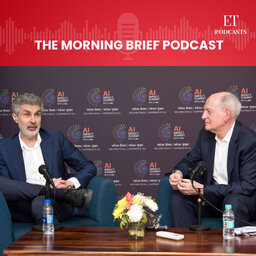The Art of Investing
Investing has evolved over the last decade into something of an art: the canvas is complex and finding the right companies, knowing how much to invest, when to plunge in and pull back and maintaining a fine balance of risk and opportunities requires nothing less than an artist’s skill, precision and even creative thinking.
In this episode of “ET Wealth and Beyond”, The Economic Times’ markets editor Nishanth Vasudevan talks to Sunil Singhania, founder of Abakkus Asset Manager LLP and Kenneth Andrade, CIO of Old Bridge Mutual Fund to understand the fine brushstrokes that paint a picture of good investment.
Listen in!
You can follow our host Nishanth Vasudevan on his social media: Linkedin & Twitter
Catch the latest episode of ‘ET Wealth & Beyond’ on etwealthandbeyond.com, Spotify, Apple Podcasts, JioSaavn, Amazon Music and Youtube.
About ET Wealth & Beyond: In partnership with The Economic Times, BSE presents the "Wealth and Beyond" podcast, a six-episode series designed to demystify the rules of investor engagement, awareness, and protection. As retail investor participation surges, navigating the complexities of securities markets and making well-informed decisions is critical. This series will feature renowned market experts, who will share insights on The Art of Investing, Traps of Tip Trading, Navigating Futures and Options and more.
By addressing these key topics, this podcast series aims to equip retail investors with the knowledge and tools they need to protect their investments and thrive in today’s markets. As securities markets evolve and the number of retail investors skyrockets, there is a need for greater awareness around investor rights, market structures, and the growing array of investment products. Investors today have access to a variety of information channels but are often exposed to unsolicited advice and promises of quick gains, leading to potential pitfalls. This series will help Educate Investors, Promote Market Integrity, Enhance Market Confidence.
Tune in to the "Wealth & Beyond" podcast series and empower yourself with the knowledge to navigate today’s financial markets responsibly.
About BSE: BSE Ltd., India’s leading exchange group, is celebrating its 150th year anniversary this year. BSE has been playing a prominent role in developing the Indian capital market. BSE is a corporatized and demutualized entity, with a broad shareholder base. BSE provides an efficient and transparent market for trading in multiple asset classes including, equity, equity derivatives, currency derivatives, commodity derivatives, interest rate derivatives, SME, startups and debt instruments.
In 1 playlist(s)
The Morning Brief
To make sense of the week’s hottest stories in business, economy, politics and markets, journalists …Social links
Follow podcast
Recent clips

US–Israel vs Iran: The War That Could Ignite the Middle East
25:33

AI Has Entered the Classroom. And Your Child's Mind.
36:45

Stuart Russell and Yoshua Bengio on Why AI Could Make us Irrelevant, then Extinct
29:16
 The Morning Brief
The Morning Brief